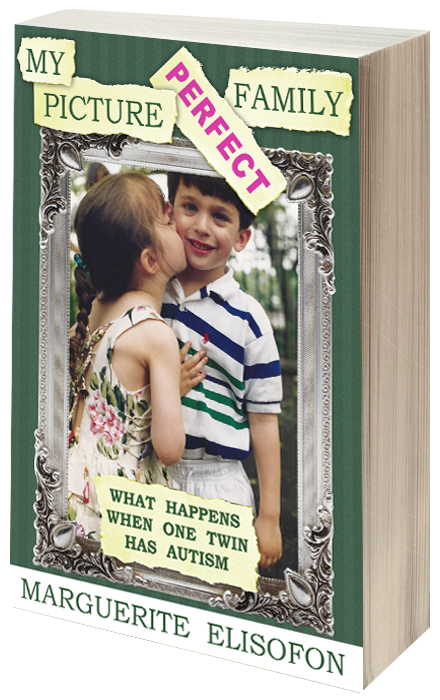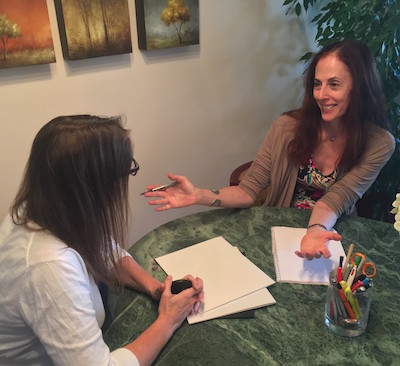 Last week, my daughter Samantha’s beloved (and brilliant) developmental optometrist Dr. Harry Wachs, died in his sleep at age 92. Although Samantha had not seen Dr. Wachs for nearly seven years, she was heartbroken. My daughter had worked with Dr. Wachs from age 10 to 18, and they enjoyed a very special relationship. Other “experts” told me “academics aren’t important for Samantha…she won’t go to college”… and “put her in a residential center when she gets older,” but Dr. Wachs expressed the opposite opinion. He was encouraging about Samantha and assured me he could help her— even though she melted down, turned out the lights in his office and locked herself in the bathroom. That dysfunctional behavior occurred at the start of a very unusual, long-distance love affair. Samantha and I travelled from NYC to Washington every six weeks so Dr. Wachs could work with her. During my most discouraged moments, Dr. Wachs promised he’d “keep taking the nails out of her coffin to free the beautiful person inside.” Samantha felt his love and optimism, and she returned them by working tirelessly on his visual, logical and motor exercises. She actually sang outside his window before we went home. When Samantha turned 13, Dr. Wachs and his wife attended her b’nai mitzvah at their own expense. By then Samantha was making eye contact and—slowly, but steadily—progressing through remedial academics toward her eventual graduation (cum laude!) from college.
Last week, my daughter Samantha’s beloved (and brilliant) developmental optometrist Dr. Harry Wachs, died in his sleep at age 92. Although Samantha had not seen Dr. Wachs for nearly seven years, she was heartbroken. My daughter had worked with Dr. Wachs from age 10 to 18, and they enjoyed a very special relationship. Other “experts” told me “academics aren’t important for Samantha…she won’t go to college”… and “put her in a residential center when she gets older,” but Dr. Wachs expressed the opposite opinion. He was encouraging about Samantha and assured me he could help her— even though she melted down, turned out the lights in his office and locked herself in the bathroom. That dysfunctional behavior occurred at the start of a very unusual, long-distance love affair. Samantha and I travelled from NYC to Washington every six weeks so Dr. Wachs could work with her. During my most discouraged moments, Dr. Wachs promised he’d “keep taking the nails out of her coffin to free the beautiful person inside.” Samantha felt his love and optimism, and she returned them by working tirelessly on his visual, logical and motor exercises. She actually sang outside his window before we went home. When Samantha turned 13, Dr. Wachs and his wife attended her b’nai mitzvah at their own expense. By then Samantha was making eye contact and—slowly, but steadily—progressing through remedial academics toward her eventual graduation (cum laude!) from college.
When I told my daughter Dr. Wachs had died, she started sobbing. “I miss him. I’m devastated! What do I tell myself? I didn’t get to say goodbye.”
I felt sad too, but relieved that he didn’t suffer. “Tell yourself that he lived a long and wonderful life—“
“But this is tragic! I’m SO upset. I don’t know what to do.”
After a barrage of similar repetitive interruptions, I was able to tell her that Dr. Wachs would always live inside her. Every time she felt her left eye drifting outward and pulled it back in, Dr. Wachs would be by her side. “There’s a memorial service in DC on Friday morning, but it would be expensive to travel there, and we’d have to get up at 6 AM,” I offered, never thinking she’d want to go.
“I want to go say goodbye,” she pleaded, surprising me. “Please! I’ll do whatever it takes.”
That’s my girl, now 25, who has a bigger heart that many neurotypicals, but still doesn’t understand subtle concepts or how to use appropriate words in delicate situations. At 6:15 AM, during the cab ride to the train station, Samantha demanded to know why she couldn’t tell Dr. Wachs’ family that his death was “horrible,” and she felt “devastated.”
“Why can’t I use MY words? Why are you always controlling me?” She fumed. “My boyfriend said it was “horrible” and “devastating” when his friend was hit by a bus and died. Why is it okay for him to say that and I can’t?”
“Because it’s not appropriate. Your boyfriend’s pal was young and died tragically. Dr. Wachs was 92 and lived a long, wonderful life. He was your doctor and mentor. That isn’t the same as a friend or even a family member.”
Not until we reached Newark 24 minutes later did Samantha agree to say she was “sorry for their loss, missed Dr. Wachs and would always keep him in her heart.” Part of our bargain was that she could use any words she wanted to express her feelings to me, her boyfriend, and her psychiatrist, but when it came to Dr. Wachs’ family, she had to put their feelings ahead of her own.
 Since Samantha is now 25, I was also able to help her gain closure and behave appropriately by discussing the other deaths she’d experienced, putting Dr. Wachs’ passing in a larger context. When Samantha was 5, my Dad died, and I told her to keep him in her heart with memories of going to the zoo and California Pizza. He had been 83 and sick a long time. At the time, that explanation satisfied my young, often spaced out daughter, (so I could deal with my own more lasting grief). At age 14 Samantha lost her beloved singing teacher, Phil, on a day she was scheduled to have a voice lesson. Phil had died unexpectedly at 52 of a massive heart attack alone in his apartment, while waiting for an ambulance to arrive. Phil’s death had felt devastating and heartbreaking for both of us, and we’d cried together.
Since Samantha is now 25, I was also able to help her gain closure and behave appropriately by discussing the other deaths she’d experienced, putting Dr. Wachs’ passing in a larger context. When Samantha was 5, my Dad died, and I told her to keep him in her heart with memories of going to the zoo and California Pizza. He had been 83 and sick a long time. At the time, that explanation satisfied my young, often spaced out daughter, (so I could deal with my own more lasting grief). At age 14 Samantha lost her beloved singing teacher, Phil, on a day she was scheduled to have a voice lesson. Phil had died unexpectedly at 52 of a massive heart attack alone in his apartment, while waiting for an ambulance to arrive. Phil’s death had felt devastating and heartbreaking for both of us, and we’d cried together.
Death is a difficult concept for anyone. But for a young person with autism, processing the loss of a loved one is an even more formidable challenge. Obviously, a lot depends on your child’s age, developmental level, and relationship to the person who has died. Was it a family member, a teacher or a friend? No matter who has passed away, parents must help their ASD children understand and deal with grief while managing our own sadness. Sometimes it’s enough to tell a small child to hug a teddy bear from a deceased family member and hold onto fun memories. In the case of my 14 year old daughter, I advised her to keep practicing the last song she worked on with Phil—“With A Song in My Heart”—and sing it at his memorial. Everyone complimented her on both her bravery and her performance, which helped her say goodbye and also continue her singing lessons with a new instructor.
As parents, we must try to be role models in all areas of life—even modeling the experience of losing loved ones—so that our children learn to say goodbye (as they must one day so with us). In the meantime, all kids—but especially ASD children—must learn how to move past grief and keep living with a song in their hearts.





 Marguerite Elisofon is a New York City writer and the author of My Picture Perfect Family, a memoir about how her family navigated life with a child on the autistic spectrum before the internet and support groups existed. She also blogs about parenting young adults and disability related issues in The Never Empty Nest. Her writing has been featured in a variety of publications, including Time and NY Metro Parents magazine, and her family’s story has been featured by the NY Post, Fox News, The Daily Mail, and on Jenny McCarthy’s Dirty Sexy Funny radio show. A Vassar graduate, Marguerite was born and raised in New York City, where she still lives with her husband, Howard, in their mostly-empty nest. She is available to speak about a wide variety of issues relating to twins, parenting, and autism.
Marguerite Elisofon is a New York City writer and the author of My Picture Perfect Family, a memoir about how her family navigated life with a child on the autistic spectrum before the internet and support groups existed. She also blogs about parenting young adults and disability related issues in The Never Empty Nest. Her writing has been featured in a variety of publications, including Time and NY Metro Parents magazine, and her family’s story has been featured by the NY Post, Fox News, The Daily Mail, and on Jenny McCarthy’s Dirty Sexy Funny radio show. A Vassar graduate, Marguerite was born and raised in New York City, where she still lives with her husband, Howard, in their mostly-empty nest. She is available to speak about a wide variety of issues relating to twins, parenting, and autism. 
Nicely written, M!
Thanks:) Hope all’s well with you on the other side of the world.
The concept of death is difficult for anyone; not only those with Autism.
I am starting a support group for the adaptations 40’s plus group entitled:
lifestyle changes support group, for those of us who have elderly parents, because it is a life style change.
things change for us when our parents get older, and we tend to worry about what is gong to happen when our parents are no longer around.
Building up our network and knowing who to rely on is important too.
Death is hard to deal with, whether or not it is a loved one, a friend, a doctor that
you have been going to for a while, etc…..
Writing about it, talking about it; and most importantly, remember, the deceased are not suffering anymore, no matter whether at what age they pass away,
also important: live each day to the fullest… and get the most out of life and enjoy life.
So true! Glad you are starting a support group and offering help to those who need it.